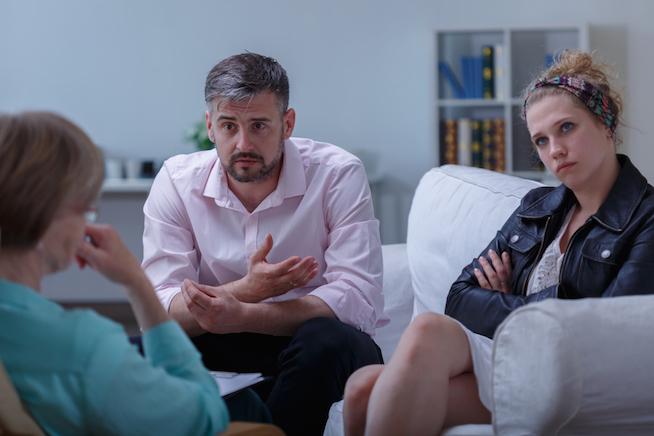
I wish we had started going sooner instead of waiting for everything to implode.
I think we both knew that the relationship wasn’t going to work out anymore, but we both were and are huge believers in the power of therapy, and we wanted to see if therapy could help us.
A few years ago, my boyfriend of two years and I went to couple's therapy. To say our relationship was falling apart would have been an understatement.
My partner had developed a new value set that didn’t jive with my own, and we had a huge and traumatic fight, which added stress to the already volatile home we were living in. The two of us were living with another couple, and one of them was going through a literal nervous breakdown. Things on the home front were a mess, and so was my relationship.
My partner and I had been through a lot together. We’d known one another for years before dating, we’d seen each other at our respective worst, poured out our guts, and tried new things. I think we both knew that the relationship wasn’t going to work out anymore, but we both were and are huge believers in the power of therapy, and we wanted to see if therapy could help us.
Ultimately we decided to end things even after giving it a go with professional help, but I think couple’s therapy was a good decision, and frankly I wish we had started going sooner instead of waiting for everything to implode. Couple's therapy is a vulnerable but valuable avenue to explore with a partner, and getting started with therapy together can feel very intimidating and scary.
Here are some quick tips for easing the process of looking for a couple's therapist:
1. Do your homework.
When my (now ex) partner decided to try therapy, we asked for references from close friends who knew others who had gone to couple's therapy. We also talked to our own individual therapists (who already knew loads about our relationship) about any of their colleagues who they thought might be a good fit for us. Ultimately, my partner and I decided to try out a psychologist recommended by his therapist.
It was important to my partner that we see a therapist with an analytical bent to their approach, and the couple's therapist we wound up seeing together definitely leaned toward the analytic tradition.
I wish I had pushed harder for a therapist who would have taken more of an empathy-based approach to couple's therapy, but at the time, I was too afraid of causing yet another dispute, and made an appointment.
2. Shop around.
When we were looking around for someone to see together, my partner and I initially discussed shopping for therapists — meaning we thought we’d take first appointments with two or three different psychologists before ultimately deciding on who we wanted to stick with for the long haul.
We failed to follow through on this plan, and I wish we hadn’t. In the end, I don’t think that any one couple's therapist could have saved our relationship, but I think we both could have learned more and had a gentler breakup if we’d waited to find a therapist who fit both of our needs instead of just my partner’s.
If I go to couple's therapy again in the future, I will certainly make first appointments with a few different people before making the final decision.
3. Don’t get discouraged by costs.
When you’re looking for a couple's therapist, you may find that the therapist can’t take insurance for the visits unless both you and your significant other are covered by the plan. This came as unwelcome news to me at the time that I started couple's therapy, and I was immediately unsure if I’d be able to afford my share of couple's therapy.
Fortunately, our therapist had sliding scale options for clients who could not use insurance for their sessions. They also recommended strongly that my partner and I split the cost of our therapy 50/50 so that there wouldn’t be any uncomfortable feelings or resentment about the financial aspect of therapy. I agree with this in principle, but my partner made significantly more money than I did at the time, so the financial burden was not equal (even though the flat costs were).
4. Do your therapy homework.
If your couple's therapist gives you and your partner or spouse homework (and they most likely will) to do together, do it.
If you’re going to sessions once a week, there’s plenty of time in between to get to the (sometimes awkward) work of dealing with your relationship’s problems in real life. The homework you get will vary depending on your therapist’s methods and the specific issues you’re facing, but no matter what it is, it’s worth it to give it a try.
If anything your therapist suggests makes you feel uncomfortable, don’t be afraid to speak up and ask questions. They work for you and for the betterment of your relationship, so it’s OK to push back if you feel the need to.
There were times I called bullshit in couple's therapy and I’m glad I did, because it provided an opportunity for a more open dialogue between the three of us in session.
5. Understand that therapy may not save the relationship.
Depending on where your relationship is and why you’re going to therapy, things could be really challenging to sort out.
No matter how hard any of us work on a relationship, sometimes it just doesn’t last, and that’s OK. Therapy is often a really good step to resolving problems or working through a complicated time, but despite best intentions and desires, there isn’t always a way to get things where you’d like them to be or resolve important differences. Don’t beat yourself up if the relationship has to end despite the hard work you did in therapy.
Whether you get through the rough patch with your partner or ultimately have to see yourself through a breakup, you can rest assured knowing that you did all you could.







